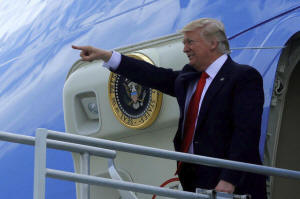|
Trump's faulty trade math may not make
America greater, or richer
 Send a link to a friend
Send a link to a friend
 [April 29, 2017]
By Howard Schneider [April 29, 2017]
By Howard Schneider
WASHINGTON (Reuters) - By U.S. President
Donald Trump’s math, renegotiating the North American Free Trade
Agreement and other deals will largely pay for the massive tax cuts his
cabinet laid out earlier in the week.
He is likely off by a factor of close to 10 - or more - according to
trade and tax economists who say it does not make sense to think of the
world in the two-dimensional, money-in-my-pocket or money-in-yours way
that Trump did in a Thursday interview with Reuters.
The president, for example, said that given the current $61 billion
annual trade deficit with Mexico, the United States would be better off
if the two countries did not trade at all, saying "You'll save yourself
a hell of a lot of money."
The former real estate developer's economic assessment appeared to
overlook the ways in which a total halt to trade between the two
neighbors would ripple through both nations - changing prices, currency
values, jobs and wages, arguably helping some industries but damaging
others.
The net impact of Trump's calculations, which run counter to most widely
accepted views of the benefits of trade, are hard to predict, said
Claude Barfield, a trade expert at the conservative American Enterprise
Institute.

"These views about the trade deficit and its alleged negative
impact...are nonsense, and are views he has held since the 1980s," said
Barfield.
"It could happen," he said of a hypothetical severing of ties between
the United States and Mexico, "but the things you would do to make it
happen would be hugely disruptive. You'd have to think what are the
first- and second-order effects," as industries reorganize and consumers
adapt.
In the case of Mexico, the American companies that exported a quarter of
a trillion dollars of goods and services to that country last year would
be out a customer, and likely cut jobs.
Those American companies that tried to replace the $323 billion in
Mexican imports would likely do so at a higher cost -- assuming they are
in the United States to begin with.
NO MORE GUACAMOLE AND A SHRINKING SUPPLY CHAIN
There is no guarantee that if Trump were to seal the border with Mexico
that it would "save" the United States any money, said Marcus Noland, a
trade economist at the Peterson Institute for International Economics.
It may simply reduce consumption through higher prices charged by
domestic suppliers, or lead to increased imports from a different
country.
"Americans seem to really like guacamole," Noland said, "but the idea
that we are going to have giant greenhouses and lots of avocados and
limes - the fact that we are purchasing them from the Mexicans rather
than producing them at home tells you producing them at home is more
expensive. We can stop trading with the Mexicans, and have $60 billion
less in consumption."
Since consumption accounts for a large part of the U.S. economy, that is
not an outcome Trump would want, though it would be one way, economists
note, to achieve the trade balance the president and his advisers regard
as important.

[to top of second column] |

President Donald Trump arrives aboard Air Force One at
Hartsfield-Jackson International Airport in Atlanta, Georgia, U.S.,
April 28, 2017. REUTERS/Jonathan Ernst

Trump told Reuters: "There is no such thing as a trade war when you
have a deficit."
Most economists disagree with the notion that the trade deficit
matters much to a country as large and self-sufficient as the United
States.
Trade at that scale in particular is shaped by global savings and
investment patterns that in recent years have favored the United
States.
By the statistics most widely accepted among economists, the U.S.
position with the rest of the world has been steadily improving as
investment flows into the country from abroad and supports millions
of jobs.
The current account deficit – which includes trade flows,
investment, and other financial transfers across borders – has been
shrinking for more than a decade and is now less than 2 percent of
gross domestic product.
As far as the impact of trade on the federal deficit - a separate
concept reflecting how much the government spends and how much it
collects from businesses and households - Trump said that he was not
worried that his plan to cut taxes will result in a sea of red ink
"because we will do trade deals that are going to make up for a
tremendous amount of the deficits."
Economists, however, say any connection is circuitous, felt through
channels like an increase in tax payments from new job holders or
stronger corporate profits -- but hard to estimate and likely small.

Even if Trump achieved his wildest success, and eliminated the
United States' $500 billion trade deficit solely through increased
exports that boosted gross domestic product on a dollar-for-dollar
basis, it would do little to dent the estimated $7 trillion in
government deficits his tax plan is projected to generate over the
next decade.
Alan Cole, an economist at the Tax Foundation, said that every
dollar of gross domestic product generates about 17.6 cents in
federal government revenue, meaning the $500 billion trade shortfall
would translate into just $88 billion in new taxes.
Even that, he said, is wildly generous.
"You have to say where is the new production coming from, which
people, which places?" Cole said. "Will it be new factories being
built, and if so why haven't they been built already?"
(Reporting by Howard Schneider; Editing by David Chance and Lisa
Shumaker)
[© 2017 Thomson Reuters. All rights
reserved.]
Copyright 2017 Reuters. All rights reserved. This material may not be published,
broadcast, rewritten or redistributed. |